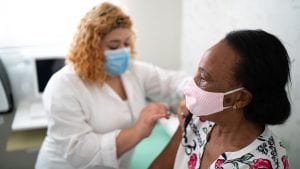
European Association of Hospital Pharmacists Director of Finance Nenad Miljković discusses vaccination issues facing healthcare professionals.
Throughout the COVID-19 pandemic, the topic of vaccination has received a lot of attention. For the European Association of Hospital Pharmacists (EAHP), and its members located in 35 different European countries, the use of vaccines has always been paramount for protecting the health of patients, hospital pharmacists, other healthcare professionals and citizens. Like any medicine, vaccines have benefits and risks. Although highly effective, no vaccine is 100% effective in preventing disease or 100% safe in all vaccinated people. Effectiveness in an individual depends on several factors, including age and other diseases or conditions that an individual might have, such as allergies, or previous contact with the disease.
Maintaining the cold chain
Reports about COVID-19 vaccines needing to be stored and transported at temperatures ranging from -20°C or even -70°C have triggered many discussions on the significance of ensuring that the cold chain remains intact during the transport and storage of the vaccine. Failure to handle and store vaccines properly can reduce their potency, resulting in inadequate immune responses in patients and poor protection against disease, all of which are outcomes that hospital pharmacists, together with their colleagues in the multidisciplinary healthcare team, want to avoid at all costs.
The responsibility to safeguard vaccine quality is a shared one among manufacturers, distributors and the healthcare professionals who administer the vaccine to patients and citizens. An effective cold chain relies on well-trained staff who know how to handle the product; reliable equipment that offers the right transport conditions and monitors temperatures; and accurate inventory management which is accompanied by adequate protocols and standard operating procedures. All actors along the cold chain have to work hand-in-hand to avoid adverse incidents as these can lead to serious consequences such as patients not receiving their vaccines in time, patients being offered a less effective vaccine and providers incurring extra costs.
Risk management
To minimise risks and to ensure the effectiveness of vaccines, storage and transport should be carried out in accordance with the recommendations of the manufacturer. Different types of vaccines exist which means not all storage and transport conditions are alike. Vaccines which are sensitive to freezing should be kept at temperatures ranging between 2°C and 8°C. Those which contain viral and/or lyophilised strains can be stored at temperatures between -15°C and -25°C. The messenger RNA vaccines (mRNA) that have been developed by some manufacturers against the coronavirus require even lower temperatures.
In case of wrong storage or incorrect handling of the vaccine, steps need to be taken. The involvement of healthcare professionals is crucial since they are trained in the processing of vaccines. Common errors include storing vials loosely and not respecting instructions. Hospital pharmacists can help with preventing these errors by storing each type of vaccine or diluent in its original packaging and a separate container. Other functions they carry out cover the regular monitoring of storage equipment to identify temperature excursion quickly to guarantee the viability of vaccine supply and the safety of patients.
Role of healthcare professionals in vaccine administration and data gathering
Good logistics are not only needed throughout the transport process but also at the point of administration. On the one hand, they are relevant for record-keeping and tracking vaccines. On the other hand, they are also crucial for co-ordinating re-vaccination intervals. Data collection which links persons receiving vaccines with the information on the dose and type of vaccine they have received is important for monitoring pharmacovigilance and adherence; as well as for other purposes such as batch level registration for side effects monitoring and recalls, where these are necessary. Databases which store this type of information should interlink with existing systems used in the hospital and community setting.
Vaccination records should be an integral part of a patient’s medication record, so that they can be used throughout the healthcare system. The record-keeping process can be facilitated by the use of scannable codes on the primary packaging. This is particularly indispensable for mass vaccination campaigns, during which many vaccine doses are administered to different groups of individuals within a vaccination centre or another location handling the vaccination process. Tracking which person receives which vaccine is pivotal for the COVID-19 vaccination campaigns as different products, which in some cases require the administration of a second dose, are used throughout Europe. For two-dose vaccines, good logistics are therefore essential to streamline the invitation messaging to the vaccine recipients and the arrangements within distribution points.

Addressing vaccine hesitancy
Combating vaccine hesitancy is another fundamental issue that EAHP is addressing in the context of vaccine distribution. It is difficult to assess if and to what extent misinformation has impacted the rollout of the COVID-19 vaccine. However, as part of the vaccination team, hospital pharmacists are raising awareness about vaccine safety and are sharing clear information with citizens who have questions. They play a significant role in providing information to their fellow healthcare professional colleagues on vaccines, their development, differences and administration patterns and by that influence the perception of vaccines and their importance for combating diseases.
Due to their training, hospital pharmacists are able to guarantee the safe handling of vaccines and are in a position to support the traceability and oversight of COVID-19 vaccines. In the context of national vaccination awareness programmes for the COVID-19 vaccines, the involvement of the expertise of healthcare professionals as trusted sources of information is important for adequately informing the public. They are also essential societal pillars, who lead by example through being vaccinated themselves and who provide objective and trusted information to improve public health.
Nenad Miljković
Director of Finance
European Association of Hospital Pharmacists
https://www.eahp.eu/
This article is from issue 17 of Health Europa. Click here to get your free subscription today.









